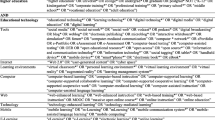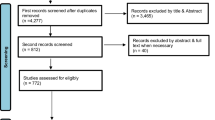Abstract
The aim of this paper is to develop an approach that can be used in addressing the issue of the use of information technology and its importance in human meaning making. By using a combination of Wittgenstein’s work method, a sociocultural perspective on learning, and a sociotechnical perspective on artifacts a specific focus for analyses was discerned: the relation between the use-of-technology in meaning-making on one hand and the circumstances for this meaning-making on the other hand. The conversations of six groups of children, who worked with an assignment, that required that they doubted information they encountered, were video recorded and analyzed. The analyses were done in three interrelated steps. (a) The students use-of-technology in meaning making, (b) the meaning patterns that the students encounter on the web, and (c) students’ intentions and habits. Our findings show that, while the mode of reinforcement of the texts used by the students may have provided little opportunity for doubt or learning how to doubt, the students’ habits and intentions with their work determined the result of the interaction, namely copying information from the web. Taking our point of departure in this empirical illustration we discuss theoretical and methodological questions concerning the understanding of the use of information technology in educational settings.
Similar content being viewed by others
References
Almqvist J. (1998). Vi och våra goda kunskaper – om (natur)vetenskaplig rationalitet och talet om IT i undervisningen [We and our good knowledge – on scientific rationality and the talk about IT in education]. Utbildning och demokrati, 7(3):61-76
Almqvist J. (2001). Bilder av Internet – en studie av IT som verktyg för meningsskapande [Images of the Internet – a study of IT as a tool for meaning making]. Utbildning och demokrati, 10(1):7-27
Almqvist, J. (2002). Undervisning och/eller underhållning [Education and/or entertainment]. In R. Säljö, & J. Linderoth (Red.), Utmaningar och e-frestelser. IT och skolans lärkultur(pp. 77-96). Stockholm: Prisma.
Almqvist, J. (2005). Learning and artifacts. On the use of information technology in educational settings. Uppsala: Acta Universitatis Upsaliensis.
Bijker, W.E. Law, J. (Eds.). (1994). Shaping technology/building society. Studies in sociotechnical change. Cambridge, MA: The MIT Press.
Bijker, W.E., Hughes, T.P., Pinch, T.J. (Eds.). (1987). The social construction of technological systems. New directions in the sociology and history of technology. Cambridge, MA: The MIT Press.
Bloor D. (1997). Wittgenstein, rules and institutions. London, Routledge
Cole M. (1996). Cultural psychology, A once and future discipline. London, The Belknap Press of Harvard University Press
Crook, C. Light, P. (1999). Information technology and the culture of student learning. In J. Bliss, R. Säljö, & P. Light (Eds.), Learning sites. Social and technological resources for learning (pp. 183-193). Oxford: Pergamon.
Dewey, J. (1966). Democracy and education. An introduction to the philosophy of education. New York: The Free Press. (Original work published 1916)
Dobres, M.-A. (2000). Technology and social agency. Outlining a practice framework for archaeology. Oxford: Blackwell Publishers.
Fann, K.T. (1993). Ludwig Wittgenstein. En introduktion. Göteborg: Daidalos. (Original work published 1969. Berkeley: University of California Press)
Feenberg A. (1991). Critical theory of technology. Oxford, Oxford University Press
Feenberg A. (1995). Alternative modernity, The technical turn in philosophy and social theory. Berkeley, University of California Press
Feenberg A. (1999). Questioning technology. London, Routledge
Fitzpatrick H., Hardman M. (2000). Mediated activity in primary classroom: Girls, boys and computers. Learning and Instruction, 10(5):431-446
Harré, R. Gillett, G. (1994). The discursive mind. Thousand Oaks: Sage Publications.
Hektor, A. (2001).What’ s the use? Internet and information behavior in everyday life. Linköping: Linköping University, Department of Technology and Social Change.
James, W. (1983). The principles of psychology. Cambridge, MA: Harvard University Press. (Original work published 1890)
Kelly G., Crawford T. (1996). Students&’ interaction with computer representations, Analysis of discourse in laboratory groups. Journal of Research in Science Teaching, 33(7):693-707
Latour, B. (1994). Where are the missing masses? The sociology of a few mundane artifacts. In W.E. Bijker, J. Law (Eds.), Shaping technology/building society. Studies in sociotechnical change (pp. 225-258). Cambridge, MA: The MIT Press.
Light, P. Littleton, K. (1997). Situational effects in computer-based problem solving. In L. Resnick, R. Säljö, C. Pontecorvo B. Burge (Eds.), Discourse, tools and reasoning. Essays on situated cognition (pp. 225-239). Berlin: Springer Verlag.
Light P., Littleton K., Bale S., Joiner R., Messer D. (2000). Gender and social comparison effects in computer-based problem solving. Learning and Instruction, 10(6):483-496
Littleton, K., Light, P. (Eds.). (1999). Learning with computers. Analysing productive interaction. New York: Routledge.
Mercer, N. Wegerif, R. (1999). Is `exploratory talk' productive talk? In K. Littleton P. Light (Eds.), Learning with computers. Analysing productive interaction (pp. 79-101). New York: Routledge.
Monk, R. (1992). Ludwig Wittgenstein – geniets plikt. Göteborg: Daidalos. (Original work published 1990. Wittgenstein. The duty of genius. London: Cape)
Östman, L. (1998). How companion meanings are expressed by science education discourse. In D.A. Roberts L. Östman (Eds.), Problems of meaning in science curriculum (pp. 54-70). New York: Teachers College Press.
Östman L. (1996). Discourses, discursive meanings and socialisation in chemistry education. Journal of Curriculum Studies, 28(1):37-55
Pleasants, N. (1999). Wittgenstein and the idea of a critical social theory. A critique of Giddens, Habermas and Bhaskar. New York. Routledge.
Resnick, L., Pontecorvo, C. Säljö, R. (1997). Discourse, tools and reasoning: Essays on situated cognition. In L. Resnick, R. Säljö, C. Pontecorvo B. Burge (Eds.), Discourse, tools and reasoning. Essays on situated cognition (pp. 1-20). Berlin: Springer Verlag.
Rorty R. (1980). Philosophy and the mirror of nature. Princeton NJ, Princeton University Press
Roth W.-M. (1996). The co-evolution in situated language and physics knowing. Journal of Science Education and Technology, 5(3):171-191
Roth W.-M. (1997). Being-in-the-world and the horizons of learning: Heidegger, Wittgenstein, and cognition. Interchange, 28(2-3):145-157
Säljö, R. (1996). Mental and physical artifacts in cognitive practices. In P. Reiman, H. Spada (Eds.), Learning in humans and machines. Towards an interdisciplinary learning science (pp. 83-96). Oxford: Pergamon/Elsevier.
Säljö, R. (1998). Learning inside and outside schools: Discursive practices and sociocultural dynamics. In D.A. Roberts & L. Östman (Eds.), Problems of meaning in science curriculum (pp. 39-53). New York: Teachers College Press.
Säljö, R. Bergqvist, K. (1997). Seeing the light. In L. Resnick, R. Säljö, C. Pontecorvo, B. Burge (Eds.), Discourse, tools and reasoning. Essays on situated cognition (pp. 385-405). Berlin: Springer Verlag.
Schofield, J.W. (1995). Computers and classroom culture. Cambridge, UK: Cambridge University Press.
Skolverket. (2001). The Swedish schoolnet. Retrieved Sept. 14, 2003 from: http://www.skolutveckling.se/skolnet/pdf/SkolvENG28.pdf
Taylor, C. (1991). Overcoming epistemology. In K. Baynes, J. Bohman, T. McCarthy (Eds.), After philosophy. End or transformation? (pp. xxxx). London: The MIT Press.
Underwood, J., Underwood, G. Wood, D. (2000). When does gender matter? Interaction during computer-based problem solving. Learning and Instruction, 10(5), 447-462.
Wertsch, J.V. (1993). Voices of the mind. A sociocultural approach to mediated action. Cambridge, MA: Harvard University Press.
Wertsch J.V. (1998). Mind as action. Oxford, Oxford University Press
Wickman P.-O., Östman L. (2002a). Induction as an empirical problem: how students generalize during practical work. International Journal of Science Education, 24(5):465-486
Wickman P.-O., Östman L. (2002b) Learning as discourse change: A sociocultural mechanism. Science Education, 86(5):601-623
Wittgenstein, L. (1972). Über gewissheit /On certainty. New York: Harper Row, Publishers. (Original work published 1969)
Wittgenstein, L. (2001). Philosophische untersuchungen/Philosophical investigations. Oxford: Blackwell Publishers. (Original work published 1953)
Author information
Authors and Affiliations
Corresponding author
Rights and permissions
About this article
Cite this article
Almqvist, J., Östman, L. Privileging and Artifacts: On the Use of Information Technology in Science Education . Interchange 37, 225–250 (2006). https://doi.org/10.1007/s10780-006-9002-z
Published:
Issue Date:
DOI: https://doi.org/10.1007/s10780-006-9002-z




